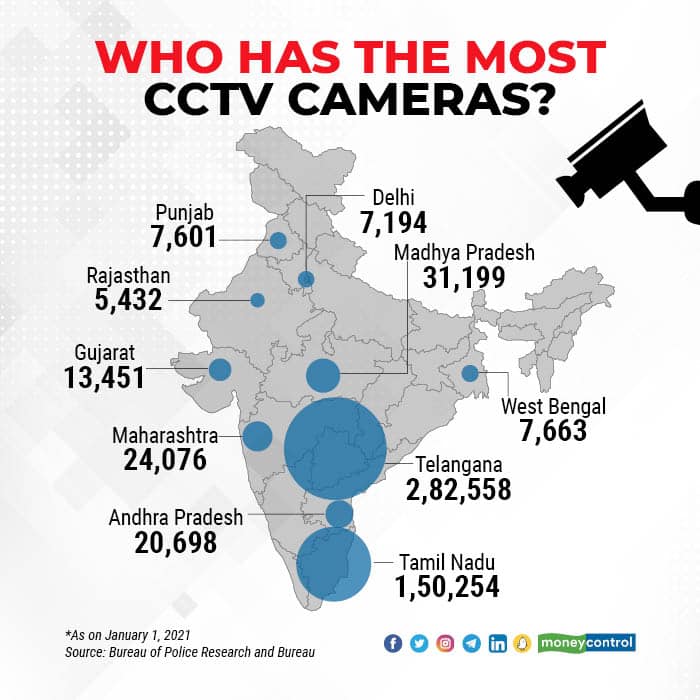



Telangana continued to be the most surveilled state in India, with 282,558 CCTV cameras installed as of January 1, 2021, according to data from the Bureau of Police Research and Development (BPRD). Tamil Nadu was a distant second with 150,254 CCTV cameras.
The latest data from the BPRD, released a week ago, showed that Telangana remained on top even though the number of CCTV cameras in the state was unchanged from a year earlier.
The highest increase in the number of CCTV cameras was in Tamil Nadu, where the number went up threefold to 150,254 from 47,375 CCTV cameras a year earlier.
Madhya Pradesh was in third place with 31,199 CCTV cameras, an increase of 26 percent.
However, the number of CCTV cameras in Maharashtra declined to 24,076 from 39,587 earlier, according to the BRPD data.

Telangana and surveillance
That Telangana and its capital city Hyderabad have been amping up their surveillance capabilities is not new. According to a Surfshark report from 2021, Hyderabad was the second-most surveilled city in the world with 480 CCTVs per square km and 30 for every 1,000 people.
A report by UK-based Comparitech in 2020 claimed Hyderabad had about 300,000 CCTV cameras, with about 30 CCTV cameras for every 1,000 people, placing it at No. 16 among the world’s most surveilled cities.
Police, politicians and bureaucrats in Telangana justify the massive number of CCTVs in the state by claiming that it helps in policing and fighting crime.
“Proud that our city is one of the best in the world in terms of No of CCTVs. We need to enhance the numbers further to reduce and keep our citizens safe,” Telangana’s IT and industries minister KT Rama Rao said in a Twitter post in August 2020.
https://twitter.com/KTRTRS/status/1292382564313751553
State education minister Sabitha Indra Reddy, while inaugurating 284 surveillance cameras at a locality in Hyderabad, was reported as saying on May 9 that surveillance makes policing easier and ensures law and order.
The Telangana government plans to increase the number of CCTVs in the state to 1.5 million, with 1 million of them in Hyderabad, according to director-general of police M Mahendar Reddy.
Not just CCTVs
The extent of surveillance in Telangana and Hyderabad is not limited to CCTV cameras. Some of them are capable of performing facial recognition and biometric scans of citizens. A Rs 600 crore Command and Control Centre of the Telangana Police is scheduled to start operations in the coming months.
Over 2,000 cameras in Telangana are artificial intelligence-enabled and can perform facial recognition scans. Cops have drawn flak for stopping passers-by and subjecting them to facial recognition scans.
The issue of facial recognition in Hyderabad was also taken up by Amnesty International in a campaign called Ban the Scan – Hyderabad that they have been running with the Internet Freedom Foundation.
Do CCTVs help in fighting crime?
“There are multiple studies, which show that there is no correlation between crime reduction and CCTV installation in an area. For instance, despite the high number of CCTVs in Delhi, the rate of crime in Delhi does not complement that,” said Anushka Jain, associate counsel of surveillance and transparency at Internet Freedom Foundation.
A study by Arizona State University in the US found there were no possible effects on crime in an area due to the presence of CCTVs or vice versa. Studies by the California Research Bureau and Surfshark also found similar results.
However, Jain pointed out that more than fighting crime, CCTVs may be inadvertently surveilling marginalised people more.
On being being asked whether the concentration of of CCTVs was higher in certain areas, Hyderabad Police Commissioner CV Anand said, "The cameras are evenly distributed all over the city and in fact are lesser in number in Muslim-dominated Old City. Anand also defended the efficacy of CCTVs by claiming, "CCTVs have really helped reduce crime by great extent."
Privacy concerns
According to the BPRD report, the number of CCTV cameras in India went up to 569,016 as of January 1, 2021, from 460,220 a year earlier.
While there is no law to regulate the usage of CCTVs in the country, the state machinery maintains that surveillance is necessary. There is also a lack of awareness among the people about their privacy.
According to Jain, people don’t understand the nuances of the privacy argument and many believe that if you’ve not done anything wrong, then you don’t have anything to hide and that’s there’s no need for privacy.
“If you want privacy, that means you are hiding something,” Jain said.
Jain pointed out that being in a public space does not mean that there cannot be any privacy. Privacy attaches itself to a human being and does not change as per the surroundings, she said.
“Obviously, the expectation of privacy is lower in a public space. But that does not mean that you don’t have any privacy in a public space,” she added.
She said the privacy discourse in India is viewed as an elitist concept.
“We need a change in the conversation around it. Because if privacy is violated, the most affected will be the marginalised communities, who do not have access to resources,” she said.
Recently a petition was filed by Hyderabad-based activist SQ Masood in Telangana High Court regarding the usage of facial recognition in the State. The court had issued notice to the Telangana government in this regard.
Discover the latest Business News, Sensex, and Nifty updates. Obtain Personal Finance insights, tax queries, and expert opinions on Moneycontrol or download the Moneycontrol App to stay updated!